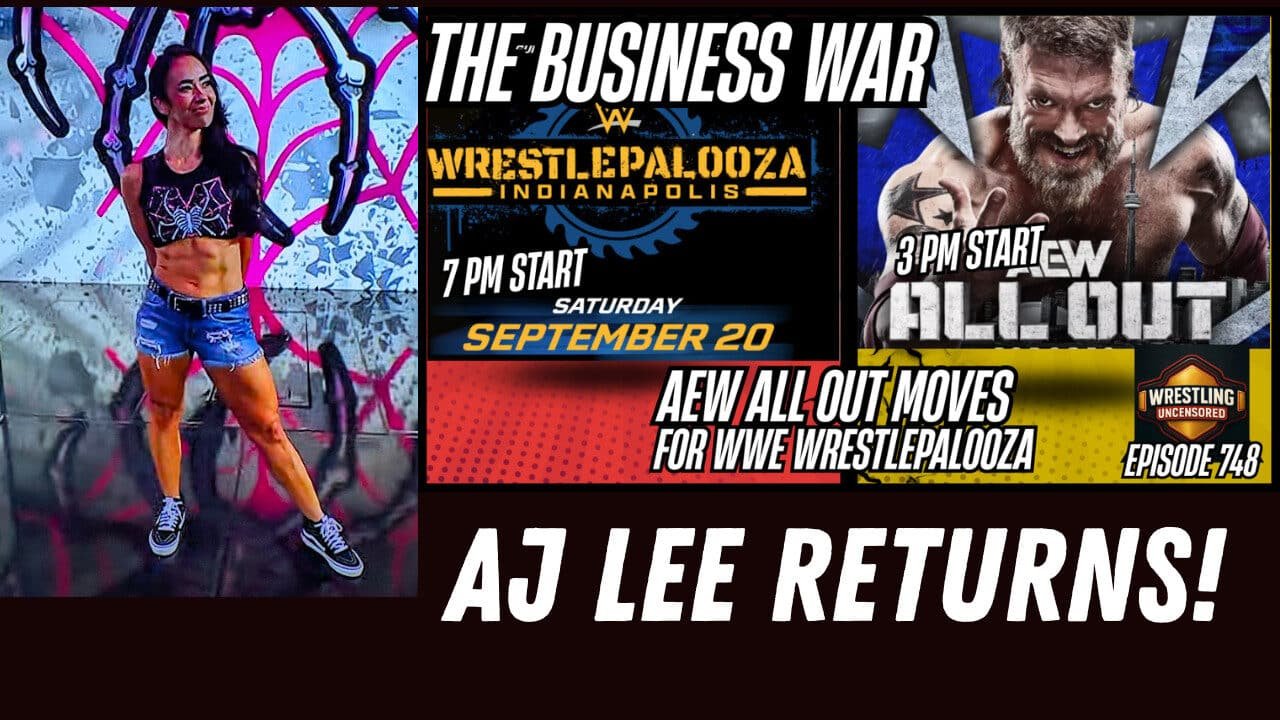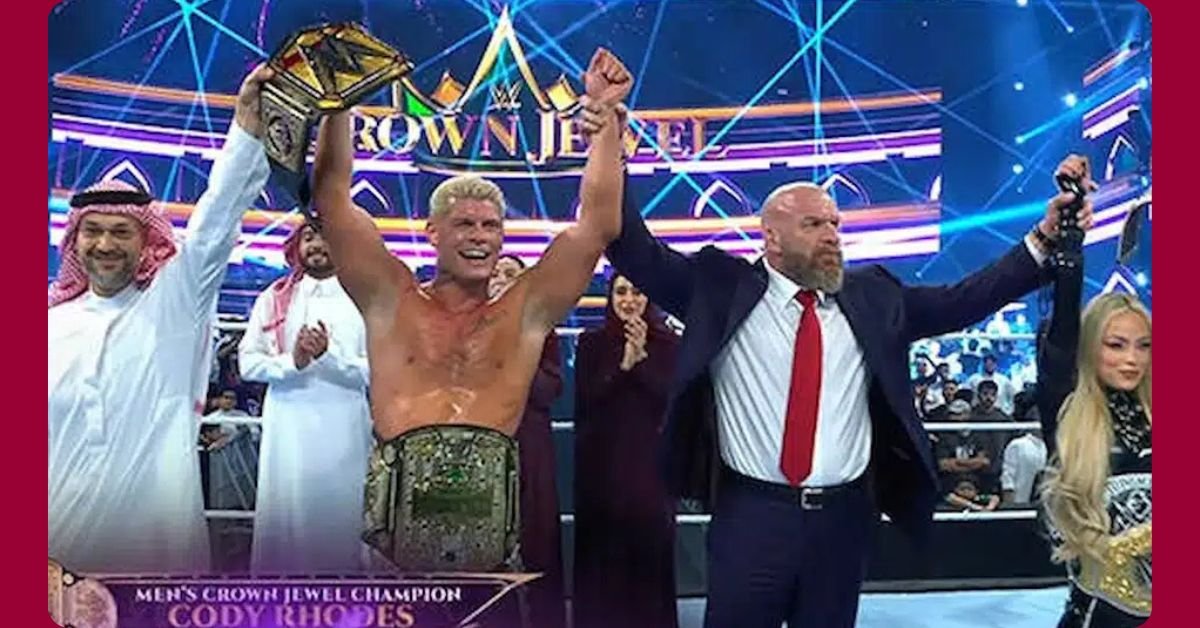AJ Lee shocked the wrestling world with her return to WWE SmackDown in Chicago, setting up a blockbuster mixed tag team match while simultaneously igniting the biggest counter-programming battle between WWE and AEW since the Monday Night Wars. With both promotions staging major events on September 20th, wrestling fans are witnessing a modern-day ratings war that has already seen strategic moves and surprising developments.
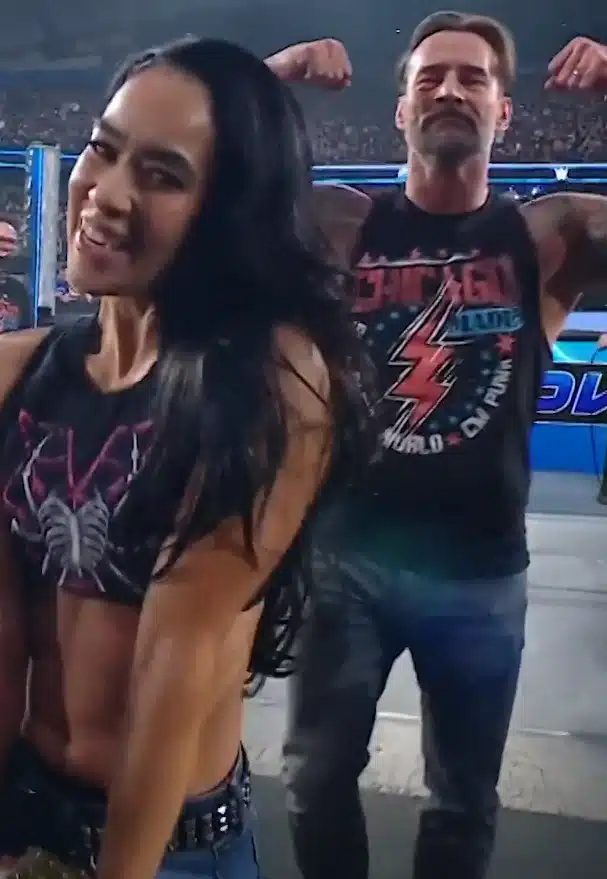
AJ Lee’s Emotional Return Divides Wrestling Fans
After years away from professional wrestling, AJ Lee made her dramatic return on SmackDown in Chicago, attacking Becky Lynch to defend her real-life husband, CM Punk. The moment generated significant buzz, though reactions from longtime wrestling observers remain mixed.
“I like AJ Lee,” admitted Dave Simon on Wrestling Uncensored Episode 748, though he tempered expectations. “She was in a different era. She had some skills, some talent, and athleticism, and I’d like to see what she could do against Becky.”
.@BeckyLynchWWE, looks like you forgot something 🤭 pic.twitter.com/YIFwhSC8hW
— WWE (@WWE) September 6, 2025
However, not everyone shares that optimism. Wrestling analyst Johnny North expressed skepticism about AJ’s in-ring capabilities after her extended absence: “I can’t say like a match that really stands out where I’m like, oh, that was an amazing match from AJ Lee. I can’t think of any off the top of my head.”
Tell her, @cmpunk! 😤 pic.twitter.com/J4HmMIvZXm
— WWE (@WWE) September 6, 2025
The Chicago Connection Proves Pivotal
AJ’s return in Chicago wasn’t coincidental. The city holds special significance for both her and CM Punk, and the crowd’s reaction reflected that connection. “Chicago loved her,” Simon noted. “I’m sure people will love her at Wrestlepalooza.”
The attack on Becky Lynch effectively wrote AJ into the ongoing feud between her husband and Seth Rollins, creating the foundation for what promises to be one of the most personal matches on WWE’s upcoming Wrestlepalooza card.
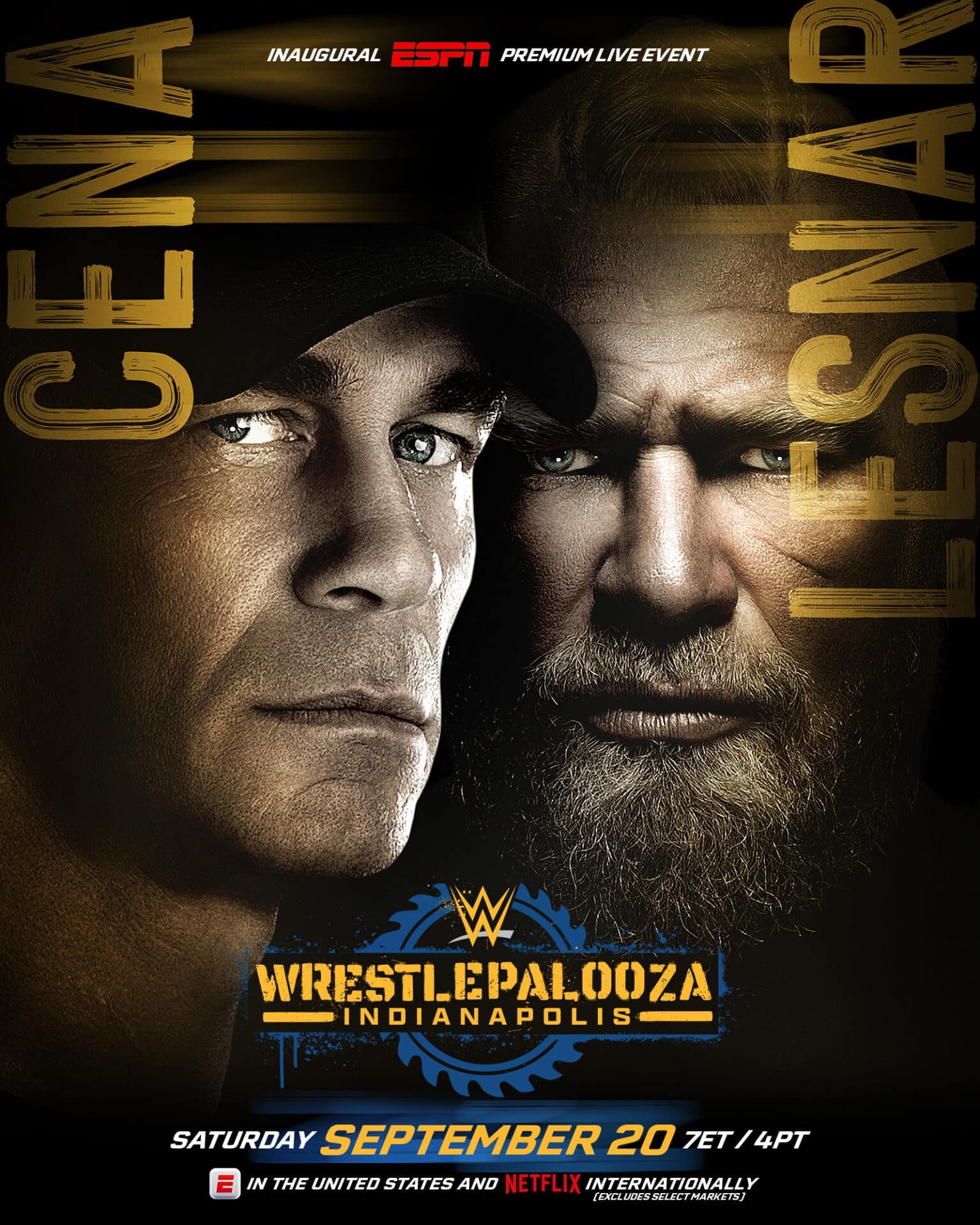
Wrestlepalooza: WWE’s Emergency Counter-Programming Response
WWE’s decision to create Wrestlepalooza from scratch specifically to counter AEW’s All Out represents one of the most aggressive programming moves in recent wrestling history. The Indianapolis show features several marquee attractions designed to draw viewers away from AEW’s established pay-per-view.
The Wrestlepalooza Card Takes Shape
Confirmed Matches:
- CM Punk & AJ Lee vs Seth Rollins & Becky Lynch (Mixed Tag Team Match)
- Brock Lesnar vs John Cena (“Last Time Ever”)
- Iyo Sky vs Stephanie Vaquer (Vacant Women’s World Championship)
The Brock Lesnar vs John Cena match carries particular weight, marketed as their final encounter after years of legendary battles. Combined with AJ Lee’s return match, WWE has assembled a card designed to capitalize on nostalgia while creating new storylines.
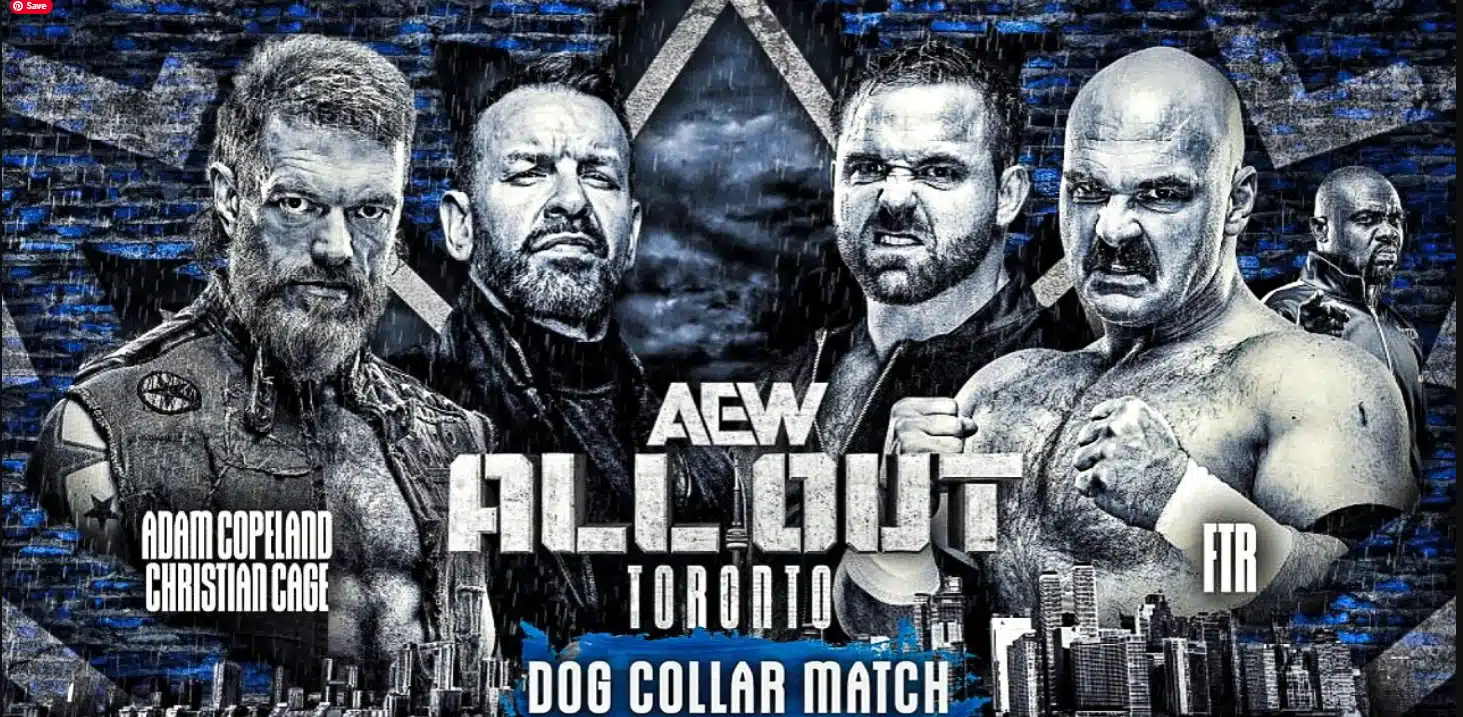
AEW Fires Back: The Time Change Power Play
Tony Khan and AEW refused to surrender without a fight. When WWE announced Wrestlepalooza for September 20th at 7 PM – directly opposing All Out’s traditional evening time slot – AEW made a bold counter-move.
“AEW this week said not so fast, buddy. We’re going to start our show instead of 7 p.m., we’ll go live at 3 p.m.” Simon explained. “We’re doing an afternoon show. So your counter programming to us, we’re countering the counter programming.”
The Strategic Implications
The time change represents more than scheduling convenience. By moving to 3 PM, AEW accomplishes several objectives:
- Avoids direct head-to-head competition with WWE’s biggest stars
- Captures the afternoon wrestling audience before they commit to other programming
- Forces WWE to compete with a satisfied wrestling audience by evening
“I think that’s a fun move,” Simon noted. “Fun move from AEW, going oh yeah. You want to run a show… Well, how about we run early? So then we’re on before you.”
Current AEW All Out Card Analysis
Despite the scheduling chess match, AEW’s All Out card currently appears lighter compared to WWE’s star-studded Wrestlepalooza lineup:
Confirmed AEW All Out Matches:
- FTR vs Edge & Christian
- Hurt Syndicate (Bobby Lashley, Sheldon Benjamin, MVP) vs Ricochet & G.O.A.T (Bishop Khan & Towa Leona)
- Mercedes Monet vs Rio (TBS Championship)
Wrestling observers note the disparity in star power between the two shows. “AEW so far doesn’t have much,” Simon observed, highlighting the challenge AEW faces in competing with WWE’s nostalgic draws.
The Broader Wrestling War Context
This September 20th battle represents more than a single night of competition. It reflects the ongoing struggle between WWE’s established mainstream appeal and AEW’s attempt to position itself as a legitimate alternative.
WWE’s Advantages
- Mainstream star power with returning legends
- Nostalgic appeal through “last time ever” matches
- Network television exposure vs streaming platforms
AEW’s Strategic Response
- Timing advantage with an earlier start
- Dedicated fanbase willing to support counter-programming
- Flexibility in scheduling and presentation
Fan Reactions and Expectations
Wrestling fans find themselves caught between two compelling offerings, though early indicators suggest WWE may have the advantage in pure star power.
“No one was going to buy that pay-per-view. No one. Now they’re giving themselves a shot,” Simon assessed AEW’s situation before the time change announcement.
Afternoon scheduling may prove beneficial for families and fans concerned about late-night viewing, particularly on Sundays. “I’d be happy,” Simon said about the earlier start time. “Plus, it’s a smart move.”
What This Means for Wrestling’s Future
The September 20th battle could establish important precedents for how wrestling promotions approach scheduling conflicts. WWE’s willingness to create an entirely new pay-per-view for counter-programming demonstrates the value they place on limiting AEW’s momentum.
Meanwhile, AEW’s tactical response shows the promotion’s growing sophistication in competing with WWE’s resources and star power.
The Bottom Line: A Return That Divides Opinion
AJ Lee’s return catalyzes wrestling’s biggest scheduling conflict in years, though the long-term impact remains questionable. While her emotional connection to CM Punk provides WWE with compelling narrative material, serious doubts persist about her ability to deliver in the ring after such an extended absence.
Dave Simon maintains cautious optimism, viewing AJ’s return as an opportunity to see how she performs against modern talent. However, his enthusiasm remains tempered by broader concerns about the repetitive nature of the Punk-Rollins feud itself.
Johnny North’s assessment proves far more critical: “I’m not looking forward to this at all,” he stated bluntly about the upcoming mixed tag match. “I don’t think I’m going to be impressed by this, but it’s going to happen. And we’re just going to get through another match.”
The real winner of September 20th may ultimately be determined not by AJ Lee’s ring rust or WWE’s nostalgic draws, but by which promotion better understands their audience’s evolving expectations. Whether AEW’s strategic time change proves effective or WWE’s star power overwhelms the competition, this counter-programming battle represents the most significant scheduling conflict since wrestling’s golden era.
As the hosts concluded their analysis of wrestling’s current landscape, one thing became clear: September 20th will either validate WWE’s faith in returning stars or demonstrate that modern wrestling fans demand more than nostalgia to capture their attention.
AJ Lee shocked the wrestling world with her return to WWE SmackDown in Chicago, setting up a blockbuster mixed tag team match while simultaneously igniting the biggest counter-programming battle between WWE and

